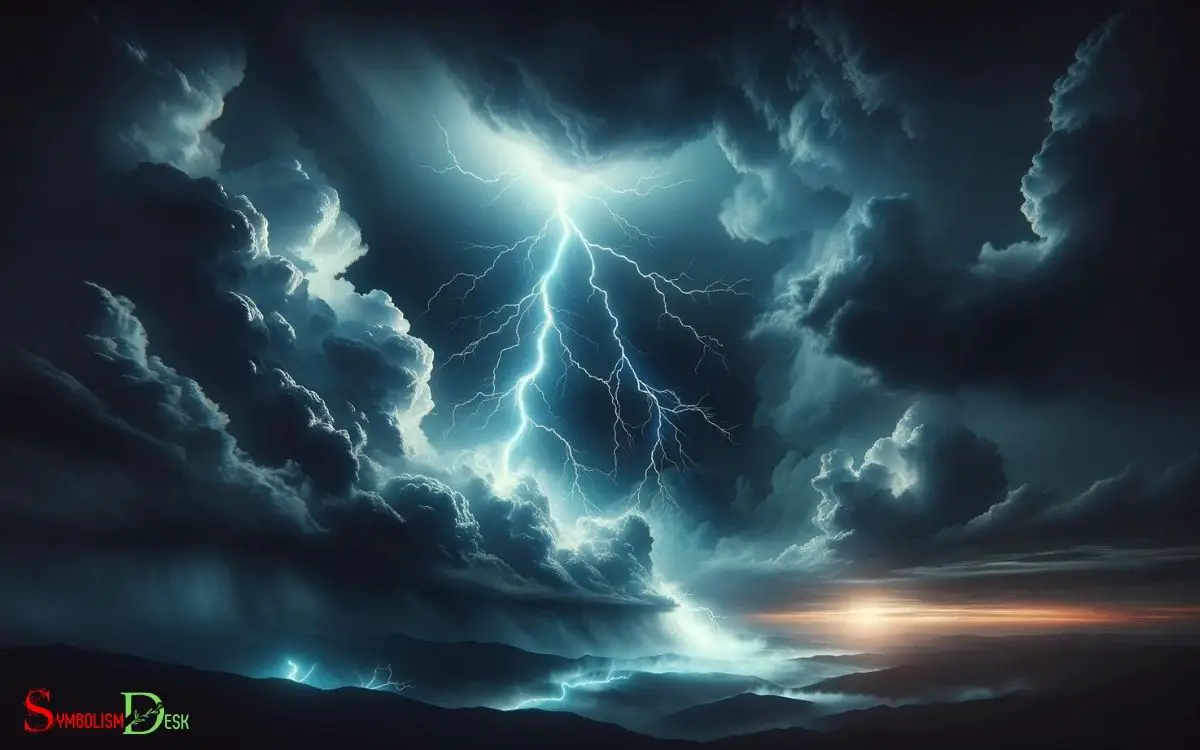What Is the Symbolic Meaning of Lightning? Intervention!
Lightning symbolizes power, speed, illumination, and the sudden awakening of the human consciousness. It often represents divine intervention, enlightenment, and the swift, irreversible changes that can occur in life.
The symbolic meaning of lightning is rich and varied:
- Power and Strength: Lightning is a natural display of immense energy, often symbolizing raw power.
- Speed and Suddenness: The rapid occurrence of lightning strikes signifies swift changes or fast actions.
- Illumination and Enlightenment: Lightning provides light, metaphorically representing knowledge, ideas, or epiphanies.
- Divine Intervention: Many cultures view lightning as a tool of the gods, signifying their presence or will.
- Transformation: Like a bolt from the blue, lightning can symbolize the abrupt changes or awakenings that can transform a person’s life or perspective.
Lightning embodies a sudden flash of insight, cutting through the darkness of ignorance and sparking a profound realization.

Key Takeaway
Lightning as a Symbol of Power
The lightning is often seen as a symbol of power, representing strength and authority in various cultures and mythologies. Its sudden and intense energy has long been associated with divine forces and supremacy.
In Norse mythology, the god Thor’s weapon of choice was a mighty hammer that summoned lightning, showcasing its association with strength and protection.
In many ancient cultures, lightning was believed to be a weapon of the gods, used to assert dominance and maintain order.
Even in modern times, the symbolism of lightning as a representation of power persists, often used in literature and media to convey a character’s formidable nature or a dramatic shift in power dynamics.
The awe-inspiring and commanding presence of lightning continues to captivate and inspire, embodying the essence of raw and unyielding power.
Transformation and Renewal in Lightning Symbolism
Symbolizing a force capable of immense change and rebirth, lightning embodies the potential for transformation and renewal in various cultural and mythological contexts.
In many belief systems, lightning is seen as a catalyst for profound change, often associated with the idea of renewal and new beginnings.
Here is a table illustrating the symbolic representation of lightning in different cultures:
| Culture | Symbolism |
|---|---|
| Norse mythology | Lightning as a symbol of strength and power |
| Hinduism | Lightning as a divine weapon of the gods |
| Native American | Lightning as a symbol of spiritual illumination |
| Ancient Greece | Lightning as a tool of divine punishment |
| Chinese folklore | Lightning as a symbol of powerful energy |
These diverse interpretations highlight the universal significance of lightning as a symbol of transformation and renewal.
This profound symbolism extends into the divine and supernatural associations of lightning, which will be explored in the subsequent section.
The Divine and Supernatural Associations of Lightning
In various belief systems, lightning holds a profound symbolic significance, embodying divine and supernatural associations that transcend cultural boundaries.
Many cultures view lightning as a powerful force that connects the earthly realm with the divine. It’s often seen as a manifestation of divine wrath, a symbol of spiritual illumination, or a tool used by deities to assert their influence on the mortal world.
The sudden and awe-inspiring nature of lightning contributes to its association with the supernatural, leading people to interpret it as a means of communication from the gods or a display of otherworldly power.
These divine and supernatural associations with lightning have been integral to shaping the symbolic meaning it holds in different cultures.
This symbolism is further explored in the context of mythology and folklore, revealing deeper insights into the significance of lightning in human consciousness.
Lightning Symbolism in Mythology and Folklore
Embedded in the mythologies and folklore of diverse cultures, lightning is often portrayed as a symbol of divine power and a conduit between the mortal and immortal realms.
In various mythological traditions, lightning is associated with gods and goddesses, representing their strength, authority, and judgment.
Here is a table outlining the symbolism of lightning in different mythologies and folklore:
| Mythology/Folklore | Lightning Symbolism |
|---|---|
| Greek Mythology | Zeus, the god of thunder and lightning, wields lightning as a weapon and a symbol of his power and wrath. |
| Norse Mythology | The Norse god Thor is associated with lightning, using his mighty hammer Mjolnir to produce thunder and lightning. |
| African Folklore | Lightning is often seen as a symbol of the power and anger of deities, capable of causing destruction and change. |
| Native American | In various Native American cultures, lightning is considered a symbol of spiritual illumination and a connection to the divine. |
These examples demonstrate the diverse ways in which lightning symbolism is woven into the fabric of different mythologies and folklore, reflecting the universal awe and reverence for this natural phenomenon.
Do Lightning and Rainbows Have Similar Symbolic Meanings?
Many people believe that lightning and rainbows hold contrasting symbolic meanings. While lightning is often associated with power and destruction, the symbolic meaning of a rainbow is typically linked to hope, promise, and good fortune. Despite their differences, both natural phenomena inspire awe and wonder in those who witness them.
Lightning in Literature: Symbolism and Interpretations
Continuing from the previous subtopic’s exploration of lightning symbolism in mythology and folklore, literature also showcases the profound significance of lightning through its interpretation and symbolism.
In literature, lightning is often used as a powerful symbol to convey various themes and emotions. It can represent sudden illumination, divine intervention, or a catalyst for change.
For example, in Shakespeare’s works, lightning is frequently employed to mirror the characters’ internal conflicts or impending turmoil.
Additionally, in contemporary literature, authors utilize lightning as a metaphor for inspiration and creativity, emphasizing its transformative and electrifying nature.
Through nuanced interpretations and symbolic representation, lightning in literature adds depth and layers of meaning to the narratives, leaving readers with a vivid and evocative impression of the themes and emotions conveyed.
Conclusion
The symbolic meaning of lightning is rich and diverse, encompassing themes of power, transformation, renewal, and divine intervention. In many cultures, lightning is thought to be a symbol of the gods’ anger or displeasure, and it is often associated with sudden and significant change. The image of lightning striking a tree or a landmark can also represent the idea of destruction and rebuilding. Additionally, in Chinese culture, lantern symbolism meaning is often associated with bringing light and guidance, and it is sometimes used to symbolize hope and enlightenment.
Across cultures and throughout history, lightning has been associated with supernatural forces and has played a significant role in mythology, folklore, and literature.
Its symbolic significance serves as a reminder of the awe-inspiring power of nature and the potential for transformation and renewal in our own lives.





